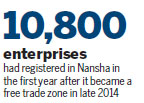Nansha New Area is working to facilitate international trade through innovation as it aims to build an open and convenient platform for businesses from across the globe.
The efforts are aimed at securing increasing trade cooperation with the G20 economies, whose leaders gathered in Hangzhou for an international summit on economic cooperation.
The new area, located in Guangzhou, the capital city of Guangdong province, is part of the Guangdong Pilot Free Trade Zone, which also includes Qianhai in Shenzhen and Hengqin in Zhuhai. More than 140 innovative achievements have been made in Nansha since its official launch as a free trade zone in April 2015.
In one such achievement, for example, by integrating internet technology with traditional customs clearance, Nansha has facilitated swifter and more convenient customs clearance procedures. The new system cuts out the need to physically travel to customs offices.

"Our business has increased 50 percent year-on-year thanks to the enhancement of (customs) efficiency," said Qu Yanqian, deputy general manager of Nansha-based Guangzhou Runshun International Transport Agency Co Ltd.
"An increasing number of enterprises have been attracted to go through customs in Nansha. As a result, the number of international shipments has grown considerably there."
The new area has also advanced innovation in cross-border e-commerce supervision and speeded up the process of export tax rebates, shortening the period from 20 working days to just three.
According to a research report by the Institute of Free Trade Zones of Sun Yat-sen University in Guangzhou, Nansha ranked first in "innovation in trade facilitation systems" among the country's four free trade zones. The other three zones are in Shanghai, Tianjin and Fujian province.
Such innovation has propelled Nansha's economy to achieve rapid growth. The GDP growth rate of the new area has ranked first among all areas in Guangzhou for 10 consecutive quarters, according to the local government.
An increasing number of enterprises have been attracted to set up offices in Nansha. Official statistics show that more than 10,800 enterprises had registered in Nansha in the first year after it formally became a free trade zone in late 2014. In the first half of this year, the number of newly registered enterprises in the area reached 6,005, with registered capital hitting 42.9 billion yuan ($6.4 billion).
In addition to introducing innovative measures to promote international trade in Nansha, the Guangzhou government has also pledged to turn the new area into the city's sub-center.
Ren Xuefeng, Party chief of Guangzhou, said Nansha New Area has the foundations and market conditions necessary to become the city's sub-center as it possesses location, ecological and policy advantages. It is not only part of the Guangdong Pilot Free Trade Zone, but also one of the country's national-level new areas.
Nansha should seize the opportunity to build the subcenter, and attract the high-level resources necessary to make it a demonstration area that leads Guangzhou's future development, Ren said.
Mao Yanhua, deputy head of the Institute of Free Trade Zones of Sun Yat-Sen University, said Nansha has been the geographical center of the Pearl River Delta region, but the area needs to improve its transportation system.
To this end, the government has poured 156.1 billion yuan into 38 large infrastructure projects in the area in an effort to build a transportation network between Nansha, Guangzhou's city center and the surrounding areas.
|
A local quality inspection officer checks out a product sample. |
